| Reviews & Columns |
|
Reviews DVD TV on DVD Blu-ray 4K UHD International DVDs In Theaters Reviews by Studio Video Games Features Collector Series DVDs Easter Egg Database Interviews DVD Talk Radio Feature Articles Columns Anime Talk DVD Savant Horror DVDs The M.O.D. Squad Art House HD Talk Silent DVD
|
DVD Talk Forum |
|
|
| Resources |
|
DVD Price Search Customer Service #'s RCE Info Links |
|
Columns
|
|
|
Black Angel (Senso '45)
Surprisingly tired and rather obvious WWII study of moral and sexual corruption; a reworking of Senso. Cult Epics has released Black Angel (actually known as Senso '45; Black Angel is the overseas video title), the 2002 sex drama directed by Tinto Brass, featuring an evocative score by Ennio Morricone (certainly the most successful element of the movie), and starring Anna Galiena, Gabriel Garko, Franco Branciaroli, Antonio Salines, Simona Borioni, and Loredana Cannata. Based on Camillo Boito's novella, Senso, which Luchino Visconti very loosely adapted for his same-named classic in 1954, Black Angel ditches the original's Risorgimento time frame and moves the story of a wealthy married woman's lust-driven affair with a callow young military officer into the final days of Italy's WWII Fascist government. The results are explicit...and thoroughly familiar. Some nice extras accompany this sparkling anamorphically enhanced widescreen transfer.
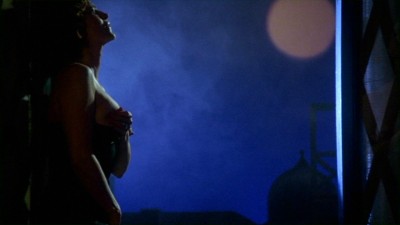
Italy, March 25th, 1945. In the waning days of the Fascist government, as the Nazis take full control of the country prior to the full-scale partisan uprising, wealthy, sex-crazed Livia Mazzoni (Anna Galiena) makes a calculated bargain. In exchange for sex with the luscious, passionate Livia, her husband's business partner, the lecherous Ugo Oggiano (Franco Branciaroli), will drive Livia to Venice, where her lover, Lieutenant Helmut Schultz (Gabriel Garko), of the German Film Unit, anxiously waits. Flashback to the beginning of their relationship. Attending a play with her husband, Carlo (Antonio Salines), a well-connected Fascist who has dealing with the country's state-controlled film industry, Livia is shaken when she sees Helmut rip the dress off his date, in full view of the shocked theatergoers. Helmut, she is told by her husband and Ugo, is a lecher who "does what he wants" without consequences because he supplies the highest-ranking Nazi officials with actresses. With one look from stud Helmut, Livia is a goner, thinking of him when she masturbates that night after her much-older husband, whom she does not love, fails yet again to sexually satisfy her. Quickly, Helmut and Livia become lovers, with Livia abandoning all rational thought as she indulges in late-found ecstasy, courtesy of the libertine Helmut; indeed, Livia is willing to do anything Helmut commands, including participating in the drug-fueled orgies that rage as Italy descends into political, and moral, chaos. So...will Livia be able to help free Helmut from the war, and escape with him to live a life of erotic passion?
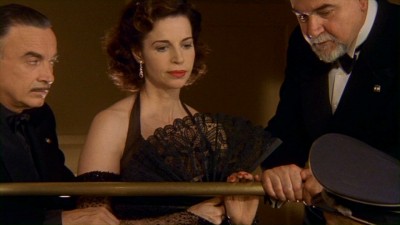
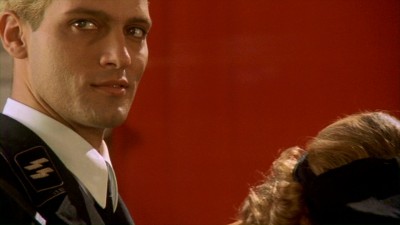
From what I've read, and according to an interview (included on this disc) with director Tinto Brass, the notorious Italian director of Salon Kitty, The Key (and one of my favorites, L'Urlo), Brass came upon the idea of "remaking" Senso when he found Camillo Boito's celebrated novella in a second-hand Parisian bookstore. Reading it, and finding that famed director Luchino Visconti only used the barest bones of the story for his masterful 1945 cinematic adaptation of the same name, Brass decided to mount his own movie that more closely followed the novel, while further avoiding comparisons to Visconti's classic by changing the timeframe to the Second World War. Gone would be Visconti's rapturous visual emphasis on the Risorgimento period of Italian unification, and specifically the war with Austria, to be replaced by Brass' examination--perhaps more in line with the novel's envelope-pushing Scapigliatura avante-garde origins?--on the personal sexual frenzy released in Livia when she abandons any moral compass in her affair with the lecherous Helmut. Brass, who had languished in critically-dismissed soft-core erotica for much of the 90s, saw Black Angel as a chance to direct something more serious...while still indulging his penchant for in-your-face fetishism.
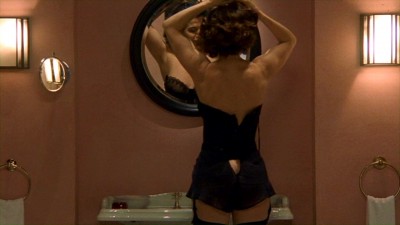
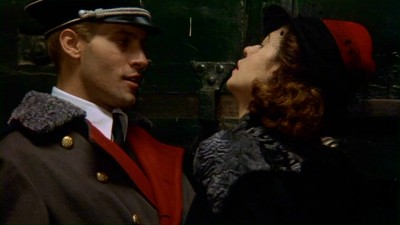
To be honest, I don't think I've watched another Tinto Brass movie since I reviewed his wild L'Urlo back in '09. I'm not sure what I was expecting when I picked up Black Angel in our screener pool; maybe I thought it would be another excessive exercise in Nazisploitation, like Brass' infamous Salon Kitty. Or maybe something more upscale and serious...or upscale and ridiculous and, um...impenetrable (make your own joke there). Or maybe I just wanted to see the gorgeous Anna Galiena in various compromising situations (that one sounds right...). Imagine my disappointment, then, when this overly-familiar, not too terribly enlightening sex drama arrived. I haven't seen the original Senso since college, so I wasn't carrying over any intention of comparing the two (after reading about the production background of Brass' version, there didn't seem to be a need to compare the two, anyway, since they're both quite different, by all accounts). If anything, I was hoping against hope that Brass had abandoned his light, inconsequential soft core porn approach and perhaps reached back to the wilder days of L'Urlo, where a viewer really had to work to get at what he might be saying.
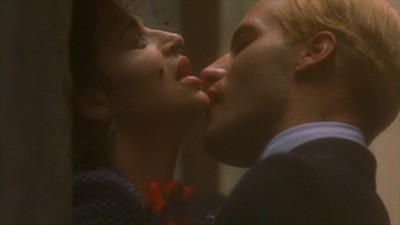
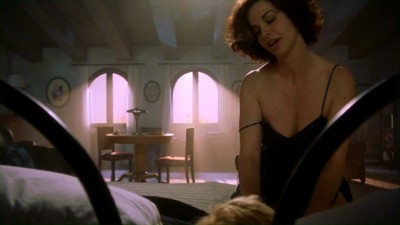
Unfortunately, far too much of what we've already seen in countless similar movies, is plainly and unimaginatively spelled out here, while the few crucial characterization points we need to understand to have the movie be, on some level, worthwhile, are discreetly ignored. Looking like a high-end photo shoot, Black Angel did initially grab me with its stylized, deliberately "fake," glossily artifical look. We start the movie in old-time black and white (an arbitrary, unrealistic visual conceit), before we flashback to the "start" of the affair--which takes place at a theatre, where Livia watches a play that parodies her impending affair. So far, so good, with Brass layering his self-reflexive commentary within some interestingly contrasted visual schemes. However, as the movie continues, we start to get the feeling that his visual design, no matter how arresting at times (for instance, his presentational style, directly aping illustrator George Grosz's pornographic prints during the orgy sequence, is pretty funny), isn't so much at the service of the story, but rather used as a hopefully distracting cover for the inadequate drama.
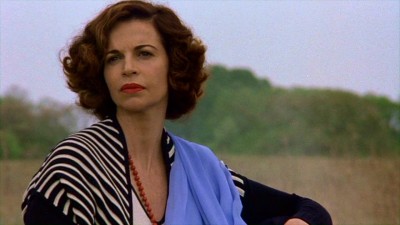
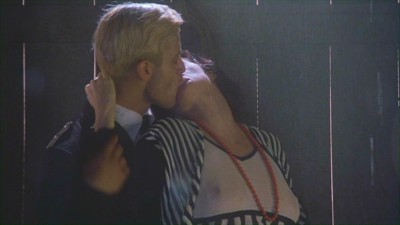
Brass states in his interview that his lead characters are essentially two very negative people, so we have to assume, if he's unwilling to let them appear sympathetic in even small ways, he's either attacking them, or presenting them to us, un-judged, for our own perusal, whether that inspection be deep or puerile (as in just getting off on the sex and nudity). It's tough to find much sympathy for Livia here, despite some viewers' all-too-ready willingness to indulge in today's shaky gender empowerment viewpoint, convincing themselves that Livia is somehow "released" from her loveless, cynical marriage by indulging in an all-consuming, destructive erotic relationship. Any viewer going down that route is pulled up short by the movie's end, when it's clear that Livia has lost anything that might have been "good" in her, when she SPOILER ALERT! rats out her betraying lover, and demands repulsive sex from Ugo after seeing Helmut killed by firing squad. The problem screenwriter Brass has, then, throughout the movie is making us want to watch what happens to these two repellent characters, when we either don't understand them...or don't care. The largest stumbling block to making that happen for the viewer is Brass' inability to either explain or at least make believable, Livia's all-consuming lust. It's not enough just to hear Livia narrate unintentionally funny lines like, "His stare violated me...I wasn't ashamed I had an orgasm," or "Strong, handsome, perverse, filthy...I liked him," or banalities like, "He had taken me beyond myself," when she engages in first-time anal sex. Those lines don't make her lust real to us, because we don't get any context for her character (was she ever "good?" She can't even remember why she married her husband, but we get the feeling it was for practical, rather than romantic reasons...so why is he the "villain?"). More importantly, we don't feel that overwhelming, insatiable, illogical, crazed lust of hers because actress Anna Galiena--no matter what she and Brass state in the interview about her getting "comfortable" doing nudity--cannot summon up a performance that goes beyond the mechanical during the sex scenes. Granted, that absence of real heat is Garko's fault, too; simply put, these two performers lack adequate chemistry together, so we just don't buy their grappling and groping. If we don't understand Livia, and what her character feels, and we don't buy her uncontrollable lust and depravity due to a lack of on-screen chemistry and a performer uncomfortable doing these scenes...what, then, are we left with in Black Angel?
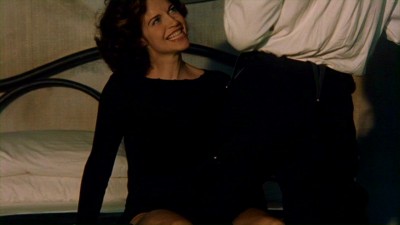
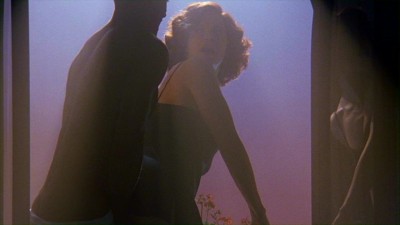
Well...whatever is left in Black Angel, it isn't terribly deep. Any attempts by Brass to make commentary on the nature of war and Italy's death-embrace of Fascism (and thus the link between Livia's moral corruption and Italy's) is ham-handed and flat-footed. We've seen those kinds of analogies between war and social/personal corruption a million times before, with game-playing Carlo and Ugo, keeping their hands in all parties, waiting for the winner to step forward, coming off as two-dimensional stereotypes. And it's not just the characters' conception that's obvious and overdrawn, it's Brass' artless, overripe "symbolism," as well. When Livia masturbates in her window, thinking of Helmut, a cat screams below in the street (a nice show, I would imagine, for anyone watching down below, by the way...). While we're getting off watching Livia schtupped by Helmut in an alleyway, Brass reverts to Rossellini and has an innocent woman shot as a partisan...before he goes in for a repulsive close-up of her exposed vagina (yes, we get it: we have to pay for our previous cheap thrill...). When Livia listens disgustedly to Carlo and Ugo discussing the various cynical political machinations they're involved in, Brass shows them grotesquely ripping into a meal, complete with a close-up of the chicken's *sshole. When Livia leaves with Helmut after their assignation at his love nest, a drunk staggers by, singing, "I feel the primordial slime in me." And when Helmut lays it out how SPOILER ALERT! he used Livia for her money, she leaves, devastated, before a drunk screams over and over again in the street, "I want to die!" One wishes such juvenile billboarding wasn't intentional...but how else can it be taken, when it happens over and over again in Black Angel?
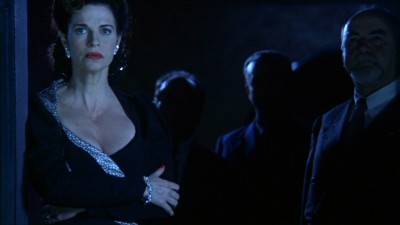
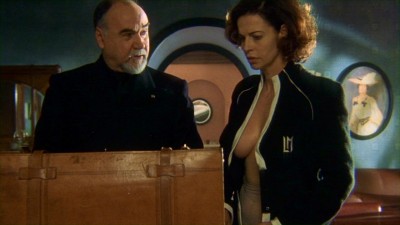
Which leaves us with the sex scenes. As noted, a serious lack of chemistry taints the encounters between Anna Galiena and Gabriel Garko, so we're left with superficial gorping at the array of bodies on screen. Don't get me wrong: I can think of worse things than two hours of watching Anna Galiena stripping down and engaging in various simulated sex acts. However...I'm not 15 years old anymore, either, and after the first initial titilation minus some sort of redeeming or at least successful esthetic...that prurient interest eventually wanes. Brass' fetishistic tendencies are muted here, and we see that he's trying to add detail that occasionally de-romanticizes the acts (Livia and then Helmut relieving themselves after coitus). But critically, in the central orgy scene, where Brass could have at least fully committed to showing the utter degradation of Livia when Helmut casually bets her sexual favors with lesbian Elsa--to which she readily agrees--Brass fades out and cuts away as Helmut and Elsa go to town on her. Why the restraint? It certainly couldn't have been for matters of taste (I suspect Galiena's concerns played a part...), but whatever the reasons were, it's just another indication that Brass' focus is, at best, compromised here.
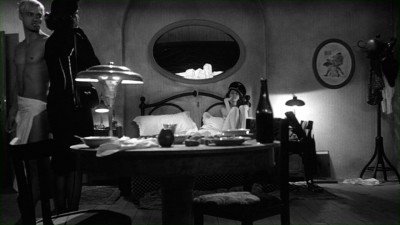
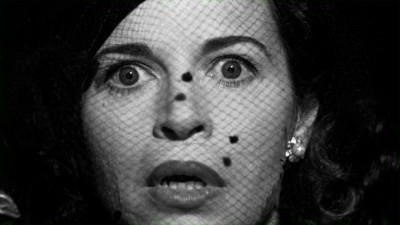
The DVD:
The Video:
The anamorphically enhanced, 1.78:1 widescreen transfer for Black Angel looks super-sharp, with rich, lush color, good detail, and no compression issues. Very nice.
The Audio:
The Dolby Digital Italian soundtracks come in either 5.1 Surround or 2.0 Stereo audio tracks are clean, with little or no hiss. Separation effects are minimal, but strong. English subtitles are included.
The Extras:
There's a Making of Black Angel behind-the-scenes featurette, running 25:22, that features Brass and the cast talking about the movie's production. There's a "Promo" reel that includes scenes of the movie, an original trailer, a photo gallery, and a big bonus--the isolated score from master composer, Ennio Morricone (you could probably buy the disc just for that...).
Final Thoughts:
Flaccid. Reheated themes we've seen countless times before, married to a glossy visual schematic that hides characters and a story not fully developed, marks Black Angel as a disappointing attempt by Tinto Brass to tone down what makes him interesting in the first place. Failed chemistry between the two leads further sets back the production...although there's nothing wrong with seeing Anna Galiena thrashing about in the buff. A rental for that, and Ennio Morricone's strong score.
Paul Mavis is an internationally published movie and television historian, a member of the Online Film Critics Society, and the author of The Espionage Filmography.


|
| Popular Reviews |
| Sponsored Links |
|
|
| Sponsored Links |
|
|
| Release List | Reviews | Shop | Newsletter | Forum | DVD Giveaways | Blu-Ray | Advertise |
|
Copyright 2024 DVDTalk.com All Rights Reserved. Legal Info, Privacy Policy, Terms of Use,
Manage Preferences,
Your Privacy Choices | |||||||













